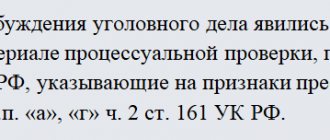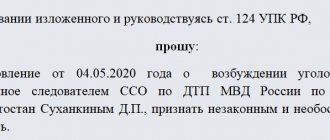Who has the right to file a complaint with the prosecutor's office?
The list of persons who have the right to file a complaint is not limited to people whose interests were affected by the action being complained of. A signed complaint against a decision to initiate a criminal case will necessarily be considered by the competent authority after it is filed by an interested person (suspect in the case) or his legal representative (lawyer, proxy). It is worth noting that the judge sets the exact date and time for consideration of the complaint, and also notifies all participants, including the applicant. In this case, consideration of the complaint may be postponed due to the non-appearance of persons who insisted on their participation in this process. On the other hand, if a fact of abuse of this right is discovered, then consideration of the complaint will begin even if there are no persons insisting on their participation.
Appeal against the court in accordance with Article 125 of the Code of Criminal Procedure of the Russian Federation
To the Collegium for Criminal Cases
of the St. Petersburg City Court
196128, St. Petersburg, st. Baseinaya, building 6
Complainant: _________________________________
Address: 191024, St. Petersburg, st. ___________ house __, apt. ___
tel. _______________ or _______________
_________________________________________
Case No. xx/xx-8x/xx
No. x/xx-1xx/xx
Complaint drawn up on behalf of the defense attorney
For comparison, we also suggest downloading another sample complaint, which is submitted to the prosecutor’s office on behalf of the defendant’s lawyer. As you can see, legal support from a competent specialist radically changes things. The text of this complaint looks more professional and, most importantly, much more convincing. Of course, you can file a complaint yourself, but to create a carefully crafted text of the document, you will have to spend quite a lot of time. As they say, one head is good, but two are better. We recommend that you cast aside doubts and contact us right now: the sooner we start, the less inconvenience the investigative actions will bring you!
Is it possible to file a complaint without the help of a lawyer?
Full implementation of the inalienable right of all citizens to appeal a decision on a criminal case (or a complaint against the refusal to initiate it) is possible if you have some experience in working (interacting) with law enforcement agencies, as well as the necessary and relevant knowledge in the legal field. Of course, any professional lawyer has the necessary experience and the necessary knowledge in this area. That is why we strongly recommend that interested parties seek the support of a specialist in a timely manner in order to increase their chances of a favorable outcome after the complaint is considered by the court. Returning to the original question, the answer is yes, you can independently draw up and submit a complaint to the district prosecutor's office.
Sample complaint to submit to the prosecutor's office
All further information will be useful not only as information, but will also become a good “instruction” for the subsequent writing of your own complaint. After all, the process of drawing up this document must be taken very seriously, because the near future of the suspect may depend on it. It is advisable first and then begin to analyze its content. Some important information can be displayed in the document a little differently, and below we will definitely show you possible variations. So, let's move on to considering the finished complaint against the decision to initiate a criminal case:
1. As in other similar statements, in the upper right corner there is a “header” of the document, where the following information should be indicated:
- the name of the district prosecutor's office and the name of the city in which it is located;
- details of the complainant, including full name, residential address and contact telephone number;
- information revealing the essence of the complaint (i.e. against a decision on a criminal case).
2. After the word “Complaint” (in the center of the sheet), all the details that are directly related to the problem that have arisen are described in detail:
- in the first paragraph, the applicant indicates the date and full name of the investigator responsible for the unlawful initiation of the criminal case;
- further, the complainant must provide arguments in defense of his position, pointing out the lack of reason and grounds for initiating a case;
- The “body” of the document ends with a request to cancel the decision to initiate a criminal case and a list of appendices to the document.
3. At the very end of the written complaint, you must indicate the date the document was drawn up, as well as put the signature of the suspect (or his legal representative).
How to draw up a document correctly
The law does not provide detailed regulations for the structure and content of a complaint drawn up in accordance with Article 125 of the Code of Criminal Procedure of the Russian Federation. However, practice has developed basic rules for drawing up such a criminal procedural appeal, compliance with which will ensure its acceptance for consideration and satisfaction of the applicant’s requests.
Attention! Our qualified lawyers will assist you free of charge and around the clock on any issues. Find out more here.
The complaint must include:
- name of the court whose competence includes consideration and decision-making. As a rule, this is the district court at the place where the criminal act was committed. However, there are often cases when an appeal against an official’s decision occurs in court at the location of the body conducting criminal proceedings. Such cases are provided for in Art. 152 Code of Criminal Procedure of the Russian Federation;
- identification details of the person filing the complaint (full name and address where he lives). If the appeal procedure is carried out by a lawyer, the document must contain information about his identity, as well as the data of the person whose interests the lawyer defends;
- Narrative Section: A critically important part of the complaint because it sets out the facts and identifies specific violations of law by the prosecution or the pre-trial investigator. In addition to the plot of the criminal case (verification material) and its number, it is necessary to indicate the reasons for filing the appeal in accordance with Art. 125 Code of Criminal Procedure of the Russian Federation. The chances of a positive outcome for the petitioner increase when the prosecution has committed several violations, and the complaint contains references to specific articles of the criminal procedure law, non-compliance with which led to the infringement of rights. The descriptive part must list all the available facts and be accompanied by appropriate argumentation. Preparing the text of a document by a non-specialist in the legal field is possible, but it requires knowledge of a large number of legal aspects and the intricacies of current legal regulations. Satisfaction of the stated requirements largely depends on the wording properly stated in the complaint;
- the pleading-resolution section, which also requires special attention. Here, at a minimum, it is necessary to outline the essence of the requirements for recognizing as illegal and (or) unreasonable the actions (inaction) of representatives of law enforcement agencies. In addition, in the same part a petition is made to impose on the official subject the obligation to eliminate the violations committed. It would not be superfluous to request the right to familiarize yourself with the materials of an inspection or criminal case for the purpose of verifying them;
- a list of documents confirming the validity of the complaint and sent along with it to the court. This part lists the originals and copies of procedural decisions, protocols and other documents confirming the arguments set out in the appeal. Within the meaning of Art. 125 of the Criminal Procedure Code of Russia, such an application is mandatory.
- date and signature of the originator of the complaint.
Often, when filing a complaint, the compiler does not have the necessary volume of documents on the basis of which he builds his position. In this case, you can make an indication in the text of the appeal that they will be provided during the consideration of the complaint.
What does Article 125 of the Code of Criminal Procedure say?
The article in question regulates and streamlines the procedure for resolving complaints by courts. The mold design includes 7 parts. Based on the content of Art. 125 of the Code of Criminal Procedure of the Russian Federation, any activity of representatives of the bodies of inquiry, investigation and the prosecutor’s office that infringes on the rights of other subjects of criminal proceedings can be appealed to the appropriate district court.
Attention! The legislation allows appeal:
- failure to take any measures or decisions (inaction);
- restriction (deprivation) of the constitutional rights of a person and a citizen of the Russian Federation that is not caused by necessity or violates the law;
- abuse of power;
- unmotivated and (or) other destructive measures not dictated by the current situation;
- other actions harmful to the defense and other interested parties.
In particular, the following measures may be appealed:
- preventing a defense lawyer or legal representative from participating in procedural and investigative actions;
- unauthorized searches or inspections of residential premises;
- seizure of items and documents that do not have evidentiary value;
- the use of preventive measures that are excessive in nature and content of restrictions, with the exception of certain restrictions that will be discussed below.
When can you appeal a criminal case?
Like any other procedures in criminal proceedings, the initiation of a case must be carried out in strict accordance with the requirements of the law - the Code of Criminal Procedure and other rules. And if at least one element is violated, it becomes possible to appeal the decision to initiate a criminal case and cancel it, thereby avoiding bringing the case to court and possible unpleasant consequences. However, for an effective appeal, one of the following situations must occur:
- there were obstacles to initiating a criminal case - there are a number of restrictions on opening a case, including the expiration of statutes of limitations, amnesty for the accused, insufficient age for criminal liability, etc., which directly prohibit initiating criminal proceedings. If the case is open, the decision can be successfully appealed;
- the established procedure for initiating criminal proceedings was not followed - the entire pre-trial investigation procedure, including the decision to open a case, must be carried out in strict accordance with current legislation. Recorded deviations and violations are grounds for appeal against the initiation of a case;
- lack of corpus delicti or insufficient justification - a criminal case must be initiated on the basis of a proven fact of an offense and evidence obtained legally. If the investigation does not have enough such evidence, the accused can appeal the initiation of the case.
In addition to the above, the basis may be the incompetence of law enforcement officers who opened the case, personal hostility, conflict of interest, etc. - in a word, any circumstances that can be interpreted in favor of the accused. Therefore, the participation of a lawyer before the initiation of a criminal case is very important - he will be able to select a suitable basis for an appeal.
Grounds for canceling a decision to terminate a criminal case
The Code of Criminal Procedure of the Russian Federation specifies two grounds for canceling a decision that terminated a criminal case, if the decision is illegal or the decision is unfounded.
But the decision may be illegal or unfounded because the investigator:
- the circumstances of the case are incorrectly determined
- the decision was made without any reasoning
- if not all circumstances of the case have been clarified
- persons who have information on the crime committed were not interrogated
- documents and evidence of the crime committed were not requested from third parties or government agencies
- there are contradictions in the explanations between the persons already interviewed
- if there are other circumstances of the case that can be clarified with the help of our lawyer for the protection of the rights of the victim in Yekaterinburg
Thus, the investigator can terminate a criminal case for various reasons, but it is not a fact that such termination will be legal.
Terms for consideration of the application
Please note! To resolve a complaint submitted in accordance with Art. 125 of the Code of Criminal Procedure of the Russian Federation, the criminal procedure law allocates no more than 5 days to the court.
This is the period necessary to verify the accuracy of the information contained in the appeal, hear the arguments of all subjects and perform other procedural actions caused by necessity. All issues are resolved during an open court hearing with the direct participation of the person in whose interests the complaint is being considered.
The law (Article 124 of the Code of Criminal Procedure of the Russian Federation) allows for the simultaneous submission of complaints both to the court and to other regulatory or supervisory authorities (officials). For example, the prosecutor. In this state of affairs, in the petition sent to the judge, it is recommended to indicate all similar complaints being considered in other authorities.
When deciding on a simultaneous appeal to the regulatory (supervising) and judicial authorities, you must keep in mind that the court will definitely take into account the negative decision of the previously considered appeal. The likelihood of a positive outcome for the applicant in this situation decreases. For this reason, legal experts advise initially going to court.
Watch the video. The procedure for considering a complaint at a court hearing in accordance with Article 125 of the Code of Criminal Procedure of the Russian Federation:








